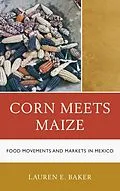This compelling book exploresthe intimate connections between people and plants, agriculture and cooking, and the practical work of building local food networks and transnational social movements. Lauren E. Baker uses corn and maize to consider central debates about food security and food sovereignty, biodiversity and biotechnology, culture and nature, as well as globalization and local responses, in Mexico and beyond. For the author, corn symbolizes the commoditization of agriculture and the cultural, spiritual, ecological and economic separation of people from growing, cooking, and sharing food. Conversely, maize represents emerging food movements that address contemporary health, environmental, and economic imperatives while rooted in agricultural and culinary traditions. The meeting of corn and maize reveals the challenge of, and possibilities for, reclaiming food from its commodity status in the global context of financial turmoil, food crises, and climate change.
Autorentext
Lauren E. Bakerhas more than twenty years of experience working on food systems issues with the Global Alliance for the Future of Food, the Toronto Food Policy Council, Sustain Ontario, and the People's Food Institute. With a PhD on maize social movements in Mexico, she has taught at the University of Toronto and Toronto Metropolitan University. Her books include Balancing the Scales: True Cost Accounting for Food and Corn Meets Maize (laurenbaker.ca).
Zusammenfassung
This compelling book explores the intimate connections between people and plants, agriculture and cooking, and the practical work of building local food networks and transnational social movements. Lauren E. Baker uses corn and maize to consider central debates about food security and food sovereignty, biodiversity and biotechnology, culture and nature, as well as globalization and local responses, in Mexico and beyond. For the author, corn symbolizes the commoditization of agriculture and the cultural, spiritual, ecological and economic separation of people from growing, cooking, and sharing food. Conversely, maize represents emerging food movements that address contemporary health, environmental, and economic imperatives while rooted in agricultural and culinary traditions. The meeting of corn and maize reveals the challenge of, and possibilities for, reclaiming food from its commodity status in the global context of financial turmoil, food crises, and climate change.
Inhalt
Chapter 1: Why Food? Why Maize and Corn?
Chapter 2: Milpas, Markets and Movements
Chapter 3: Nuestro Maíz
Chapter 4: Itanoní Tortillería
Chapter 5: The Michoacán Centre for Agribusiness
Chapter 6: Biocultural Agrifood Relations
References
